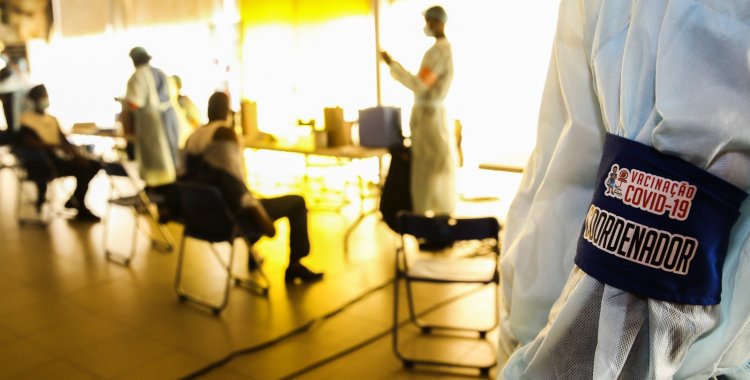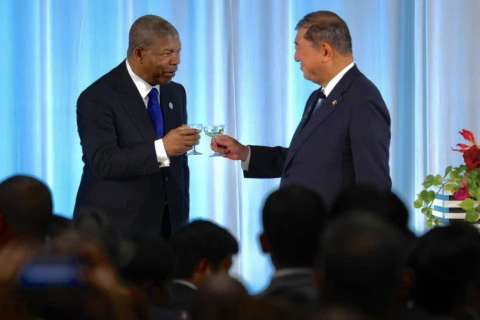Speaking to the Lusa news agency, at the Paz Flor vaccination center in Luanda, the Secretary of State for Public Health, Franco Mufinda, considered that the adhesion is being "good", continuing to mobilize human resources and efforts to acquire more vaccines and complete the 12 million doses expected for the immunization of this population of about 30 million people.
According to Franco Mufinda, the arrival of more vaccines to the country is very dependent on global production.
The official stressed that the country is still waiting for the arrival of the second tranche of the AstraZeneca vaccine, through the Covax initiative, which will allow the coverage of 20 percent of the needs of the first phase, which has as priority groups education and health professionals, the elderly above 60 years old and people with comorbidities.
"We are selecting other people who are also at risk, namely people who work in banks, who have contact with the public, in the General Tax Administration, and as we have vaccines we will select other risk groups," he stressed.
When asked to comment on the fear that many people still have to join the vaccination, Franco Mufinda admitted the need to improve communication.
"We believe that we must work on information, education, and communication, this role has to cascade, it's everyone's task, the whole society must be imbued in this activity to bring information to our population. We have to hammer, work, insist on this information so that there is a greater adhesion" to the vaccination, which is being carried out with AstraZeneca, Sinopharm and Sputnik vaccines", he stressed.
The authorities are currently administering the second dose of AstraZeneca vaccine, and until Wednesday 34,743 people of the 500,870 inoculated with the first dose had been vaccinated, according to the national director of Public Health, Helga Freitas.
In statements to Lusa, Helga Freitas stressed that the process is going "very well", noting that the first dose reached 97 percent of people in the target group and called for people to make the total immunization with the second dose.
The official agreed that there are still people who are skeptical about the vaccination process, but the authorities believe they will achieve their goal.
"I think people today are already more aware and that's our job, to make people more and more aware. We have to see that there are new variants, which can lead to much more serious stages of the disease and can even cause death, and the vaccine reduces these serious stages of the disease and mortality in populations," he stressed.
On Wednesday, who also got the second dose of the AstraZeneca vaccine was the United Nations representative in Angola, Zahira Virani, who praised the vaccination plan of the Government of Angola and urged to take the vaccine, which is safe.
"I just took the second dose of the AstraZeneca vaccine, I am here to show and say that the vaccine is safe. Also, vaccination is our best response right now to fight this pandemic and I wanted to encourage everyone who is eligible to get the vaccine," she said.
Zahira Virani praised the vaccination coverage in the country, because "covid-19 does not know passports and nationalities".
The UN representative in Angola highlighted the role of the organization in this process, through the World Health Organization (WHO), which "day and night" works with the government, with the Ministry of Health in Luanda and in the provinces.
Regarding the fears that several people still feel about the vaccine, Zahira Virani said that the issue has been discussed.
"We are working with the government to disseminate correct information, to combat 'fake news' and to ensure that the information is safe. I will give the example of England and the United States of America, where the vaccination rate is high and they are rediscovering life," she said.
Arlindo Sicato, 59, also received the second dose of the vaccine, without feeling "any change in physical or emotional terms."
"I think it went well. In the first dose I also felt absolutely nothing abnormal," he said, emphasizing that the adhesion is good, especially from the elderly, who "are afraid of dying" because of covid-19.
According to Arlindo Sicato, many people still refuse to get the vaccine because too many opinions are circulating, which "to some extent discourages a lot."
"Because they say that one is better than the other, one needs one dose and others need two doses, there have been thrombosis problems, that's all that sometimes scares people. That's why it would be better if the health services would clarify people so that they are certain of what they should do, otherwise they create doubts and that holds a lot of people back," she said.
Teresa António de Sousa, 60, is the mother of Maria Gonçalves, a nurse, 46, both of whom answered the call for the second dose of the AstraZeneca vaccine without any complaints.
"I came to get the second dose, I didn't feel anything [first dose], I don't know if I'll feel anything today," said Teresa António de Sousa, who besides her daughter also has a brother already vaccinated, but knows someone who hasn't gotten it yet out of fear.
"It is important [to get the vaccine], that's what they say in churches, for moms to get the vaccine," she said.
Maria Gonçalves confirmed that some of her colleagues have not yet had their second dose, because they had fevers during the first one.
"I think it's good that they come to do it, because this time I did the second dose and didn't have any problems, when we are immunized there are more advantages than if we are not, we run more risks", she stressed, pointing out the importance of continuing to comply with safety measures.







